-
|
05 September 2022
|Posteado en : Inf first person
Two delegations of foreign ministry and migration officials from Colombia and Ecuador arrive in Spain, on a study visit organised by the EUROFRONT programme, to learn about the border control model implemented in the Schengen area
Gema Palencia, a EUROFRONT technician, recounts the visit, which takes place between Madrid, Algeciras and Tarifa, in the form of a diary. A journey under the certainty that the only way to tackle transnational crime is through cooperation.
DAY I. 5 September 2022
There will be five days of visits to police institutions for migration management and cooperation, as well as border posts at airports and ports.
An interesting opportunity offered by the European Union programme co-led by the FIIAPP, EUROFRONT, to exchange processes and procedures, learn efficient interventions on both sides and find opportunities for collaboration that can be applied to Colombia and Ecuador and the other countries with which the programme collaborates: Argentina, Brazil, Bolivia, Peru and Paraguay.
With enthusiasm and the hope that from the meeting we will find greater opportunities for collaboration… Let’s get started!
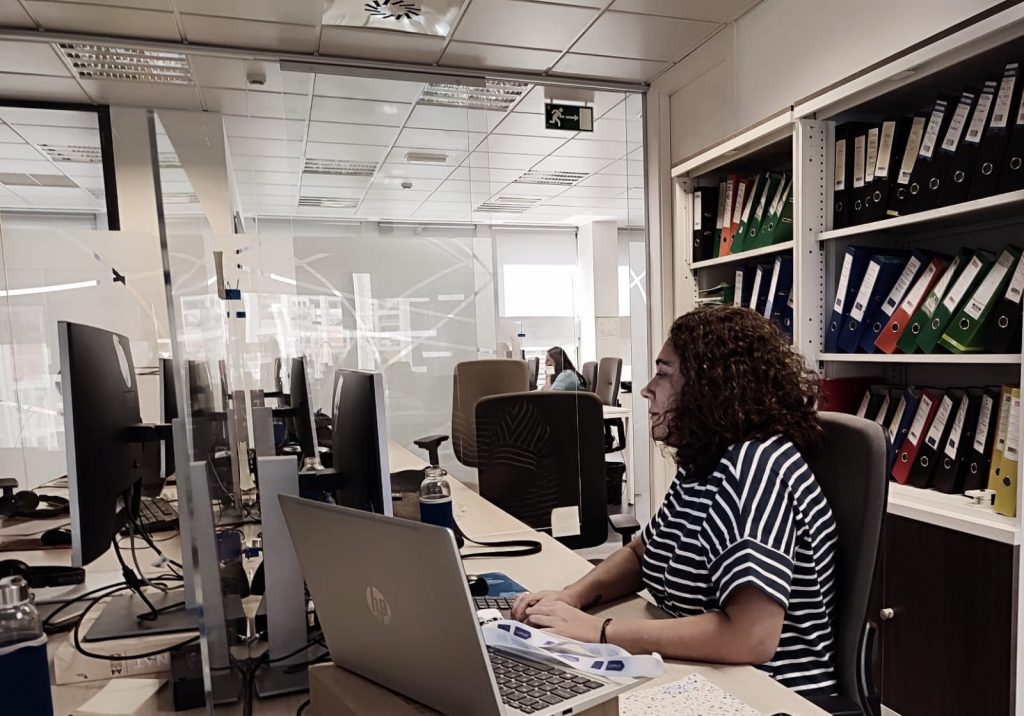
Gema Palencia, EUROFRONT technician, works in the FIIAPP office in Madrid organising the visit to Spain of delegations of foreign ministry and migration officials from Colombia and Ecuador. At the General Commissariat for Foreigners and Borders I meet the members of the delegations in person, and after numerous e-mail correspondence it is pleasant to put a face and a voice to the participants.
Despite the jet lag, they were particularly participative during the presentation by Commissioner General Julián Ávila Polo and in the subsequent presentations on the different units that make up the General Commissariat.
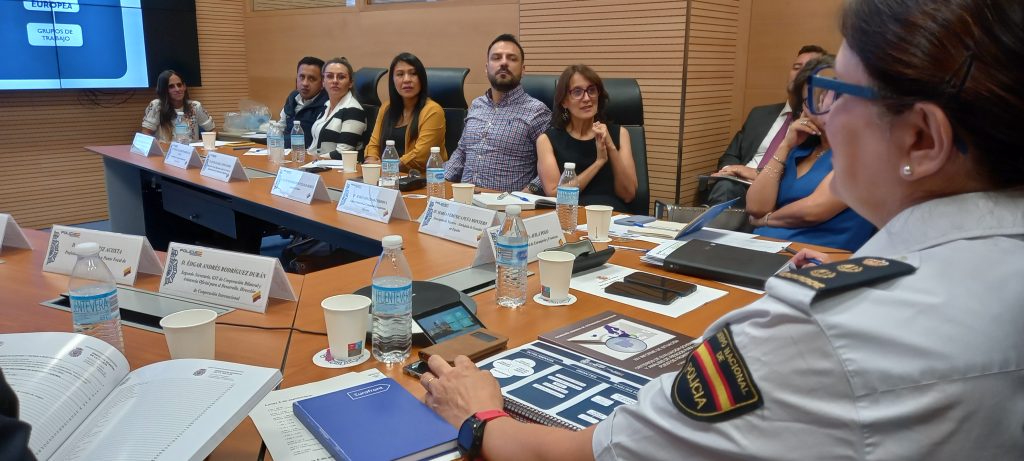
Delegations of chancellery and migration officials from Colombia and Ecuador during their visit to the Comisaría General de Extranjería y Fronteras in Madrid. Among the comments, the issue of the Venezuelan problem, common to all countries, and the exchange of information, came up for discussion. Another topic of interest is the successful experience of Punto Atenas, an operational document verification service run by experts in document forgery, which in ten months has dealt with 3,400 queries from various authorities. The idea of replicating a similar system in the Latin American region is met with great interest.
The afternoon is devoted to Barajas Airport and to getting to know in situ the operational border management in the Schengen area.
Full day 1, intense and with many open questions. We continue…
DAY II. 6 September 2022
On the way to the International Cooperation Division of the police, comments revolved around the previous day’s visit to Barajas Airport. The means of detecting forged documents or automated passages captured the most interest of the tour.
Information exchange and cooperation were the key words of Tuesday’s session. Based on the conviction that this is the only way to tackle transnational crime, the functions and effective results of the SIRENE Office, an exchange point with European police forces, as well as those of the INTERPOL and EUROPOL offices, were presented.
I continue to be surprised by the high level of interest of the delegations, and not only me, but also the rapporteurs, who are grateful to have such active participants. During his presentation, the Head of the Operational Section of the SIRENE bureau, Agustín Hernández, points out:
“A large part of today’s organised crime is transnational, therefore international police cooperation is essential to tackle it”
And among the debate arises the need to share data to combat new forms of irregular migration, and as an example, the citizens of Central Asian countries who use South American airports as a gateway to reach the United States.
The Division is also the key point of collaboration with Spanish Cooperation institutions, as it participates in the management of around 30 international projects, several of them implemented by the FIIAPP.
In the afternoon, train to Algeciras to learn about Operation Minerva and border management in the port area.
On the road…
DAY III. 7 September 2022
In the Bay of Algeciras, a sea and an ocean meet, two continents come together and cultures cross. A key point of entry to Europe from Morocco, between June and September it can see up to 2.5 million people pass through.
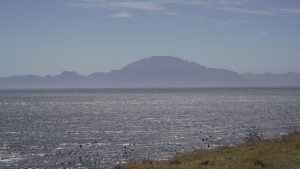
Moroccan coast as seen from Algeciras The delegations from Ecuador and Colombia have learned in situ how police teams with members of up to 17 nationalities are integrated to support the control of trafficking in persons and goods within the framework of Operation Minerva of the European Border and Coast Guard Agency (Frontex) and led by the Spanish National Police during the summer months.
This coordinated action streamlines management thanks to the specific knowledge of each country’s agents and the ease of access to their countries’ databases, which allows for rapid verification of travel documents.
An example of cooperation that has shown them the possibility of extending the current bilateral agreements that each country has with its neighbours to a regional level. The Undersecretary of the Ecuadorian Migrant Community, María Soledad Córdova, stressed that:
“The European Union is a strategic ally in border management and in addressing the challenges of migration”
They are struck by the magnitude of the movement of passengers, vehicles and goods and the effective organisational machinery in Tarifa and Algeciras, as well as the detection of irregularities and the effective cooperation that serves to alert or prevent crimes in other European countries.
It is also surprising how close Africa can be seen from the bay, much closer than it appears on the maps.
From the comments among the group and with the agents at the border, I perceive that the reflections after what we have heard and witnessed these days are taking more and more shape.
Day IV. 8 September 2022
After visiting the headquarters of the Central Unit for Illegal Immigration Networks and Documentary Forgery (UCRIF) in Madrid, we see the work on the ground in the Algeciras office.
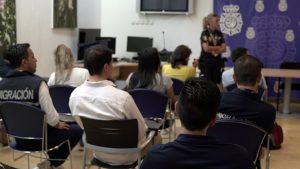
Border experts from Colombia and Ecuador during the explanations given by National Police officers at the Algeciras police station Issues detected at border controls are in many cases the thread that is pulled to unmask human or capital trafficking networks, or the clues that are shared with other international police forces, the missing piece of the puzzle to stop gangs that operate globally.
The second secretary of the Colombian Foreign Ministry’s International Cooperation Directorate, Andrés Rodríguez, points out during the visit:
“Migration challenges at the border must be addressed jointly and EUROFRONT is a programme that can provide important lessons for Colombia”
Questions about deadlines and procedures for irregular cases or the comparison of different legislations are the main part of the debate during the last day of the visit to Algeciras, in which delegations finalise all aspects related to cross-border crimes, from detection and control to investigation.
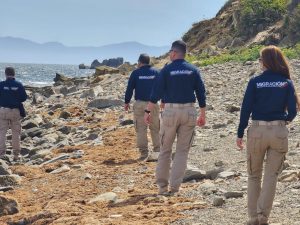
Members of the Colombian delegation observe the Moroccan coast from Algeciras And back on the train to Madrid… time for reflection. Friday’s day of conclusions looks set to be interesting.
Tomorrow we continue…
Day V. 9 September 2022
Last day….
We closed by learning about the ADEXTTRA database containing information and registration of foreigners. A swarm of interconnected databases, from various sources, which allows the cross-referencing and extraction of information of great use both for the police and for various public institutions that manage the issuance of documents and various procedures with foreigners.
The final assessment puts on the table new paths to follow in terms of training, bilateral and regional cooperation following the European model of the Athens Point, legislative harmonisation and formal follow-up, when the delegations return to their countries and the proposals to be followed are institutionally validated.
If there is one thing they all agree on, it is the positive thing of having seen that it is possible, and the high effectiveness of police and institutional cooperation, which is essential to combat cross-border crime.
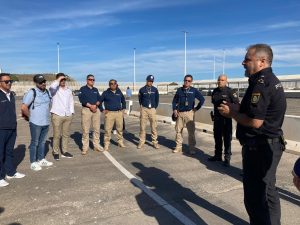
Delegaciones de Colombia y Ecuador escuchan las explicaciones durante su visita al Puerto de Tarifa The FIIAPP and EUROFRONT have also received some interesting learning. Víctor Suárez and Agustín Hernández, experts in foreigners from EUROFRONT who organised the technical visit and accompanied the delegations, emphasise how productive the exchange was and how productive it was to learn about other forms of management. They have now also noted down some highly recommendable ideas to incorporate into the processes in Spain.
The visit is over, but we are continuing with a closer and more effective collaboration, adapted to the needs of each country.

The delegations of Ecuador and Colombia pose with several agents of the National Police in the Port of Tarifa during their visit We go on…. And we are doing much better.
-
|
02 July 2020
|Posteado en : Interview
Chief Inspector Diego Alejandro Palomino speaks about fake news, what it is, the problems it causes and how it has impacted on the current Covid-19 health crisis.
FIIAPP, through some of the projects it manages, works hand-in-hand with state security forces and agencies to prevent and fight against all forms of cross-boarder organised crime. One of the new forms of crime is currently perpetrated via the latest technology. This specialist from the National Police Technological Research Unit (ITU) throws some more light on this development.
What is fake news?
Fake news can be defined as false information that appears to be true, but which intends to misinform for political, propaganda and/or economic-financial purposes.
News that falls into the category of fake news seeks to influence or manipulate the ideas of the recipients, causing confusion or deception, and taking advantage of circumstances to create fear, uncertainty and precariousness, thus making people more easily influenced.
The essential elements of this type of news combine intent and falsehood.
What are the main problems it causes?
The main problem that fake news causes is disinformation. Having knowledge of certain information usually generates unease in the recipients of the same, which in turn, can influence decision-making.
The state of alert and the problems related to the pandemic are giving rise to a high demand for goods, restrictions on mobility, anxiety and fear in people, as well as limitations in supply chains.
Any news that is generated about each or all of these activities or circumstances is being taken to the extreme; even more so when a lot of it is contradictory, thus generating greater uncertainty. This, in turn, causes people to take even fewer precautions when analysing the situation they are in and to take much more risky measures than usual.
Another problem to take into account is that quite often the information is not verified and is forwarded or disseminated without any assurance as to its truth, which contributes to its rapid expansion, thereby generating the “illusory truth effect”. In fact, very few people spread false news when they are aware that it is indeed false.
Why is it so harmful?
Fake news tends to reach many more people than true information, and may alter the criteria used to distinguish one from the other. It normally reflects an exaggerated sensationalism, which has a direct impact on people’s opinion. This type of information, due to its nature, content and objective, prevents the creation of an objective and rational judgment, thereby distorting reality and discrediting contrary information, which conditions decision-making.
Taken to the extreme, this type of information can create a domino effect, leading to substantial changes in various social, political, labour and economic matters.
In certain circumstances, fake news may even contribute to polarising society and can come to be considered as a direct attack on the quality of democracy, given its potentially overwhelming influence on public opinion.
How is it detected?
At the National Police level, we use the two fundamental tools currently available to us, due to the operational restrictions caused by the state of alarm and the functions directly entrusted to us by the instructions received. They basically consist of cyber patrolling, that is to say, monitoring social networks and tracking internet activities, and checking the information received through citizen participation.
All the information received is checked, verified and confirmed, the corresponding information notes are then issued on each event and reports on the facts and the actions taken.
Moreover, through the various police services and the secretary of state for security, reports are being issued on the control of false news, such as those drafted by the Intelligence Centre for Counter-Terrorism and Organised Crime (CITCO), the coordination and analysis body in which the Spanish security forces and agencies participate.
Has there been an increase in disinformation during the health crisis?
Generally speaking, disinformation has increased exponentially. Firstly, the dearth of true and verifiable information available about the disease itself has generated a large amount of erroneous information regarding the means of contagion, exposure, methods to avoid contagion, ways in which it may be cured, all of which generated different cases of fraud based on miraculous remedies, and even related to the Covid-19 vaccine.
Secondly, a series of social and economic needs have been generated around the disease that have led to the offer of aid by governments to alleviate them, which in turn has led to false information about the ways in which such aid can be obtained and the requirements to obtain it. Criminals have taken advantage of such circumstances to “hook” people into giving them personal data, which has caused some to become the victims of fraudulent financial transfers.
What role does cooperation play in tackling this problem?
Cooperation has a fundamental role in the fight against any criminal activity or any other that prioritises the interests of a few to generate sweeping changes, either in society or in people’s way of life.
In a globalised world where there is an absence of barriers and borders in the exchange of information and rapid access to it, countries must act in unison to combat the shared danger posed by the spread of false information that becomes generalised and reliable merely by the fact of being repeated.
Police and judicial cooperation must fight disinformation, just as it fights against organised crime, exchanging experiences and good practices and promoting the publicity of public actions in the fight against practices that seek to subvert established political orders, given that disinformation directly jeopardises democracy and people’s freedom.
-
|
14 May 2020
|Posteado en : Interview
On 17 May, World Telecommunication and Information Society Day is held and FIIAPP is working on various projects, such as EL PAcCTO and Apoyo a AMERIPOL, which promote action by the security forces and corps against internet crime
To commemorate this day, we interviewed Diego Alejandro Palomino, from the Technological Investigation Unit of the National Police, to have him clarify concepts related to telecommunications security and the cyber-patrolling work they carry out to fight cyber crime.
What is the dark web, and how is it different from the deep web?
The content of the web is a conglomerate of files of all kinds, which are usually indexed, that is, they can be found by searching through the different search engines that exist. That would be the “surface web”, the one to which all users have access and which, however, may correspond to just 4-5% of net content.
The “dark web”, on the other hand, corresponds to content that is not indexed, that is, the content hidden, a priori, from the usual search engines. The contents of the “dark web” pursue anonymity in the source and destination of the information transmitted, whether deliberately or otherwise, which is why it is often accessed through specific applications. Despite this, these applications are used in the same way for searching the “surface web”.
Although we can speak of a distinction between the “dark web” and the “deep web”, in practice such differentiation makes little sense. It is true that to refer to the “deep web” the example of an iceberg is usually used, with three parts distinguished therein: the upper part, which is located above the water, which would correspond to the “surface web”; the contiguous submerged part (or intermediate part), which would correspond to the networks and technologies pursuing anonymity in the source and destination of their transmissions, which would be the “dark web”, and the lower peak, which would be the websites or databases that escape all types of search engine indexing and are very difficult to access, which would correspond to the “deep web”.
What is the work of the Technology Research Unit on the dark web?
The tasks of the Central Cybercrime Unit include investigating all crimes related to Information and Communication Technologies (ICTs), and a large part of its work is done on the web, without differentiating where the information is found, where the crimes are committed and where the criminals are located.
One of the main tasks carried out by the National Police consists of the prevention and investigation of crimes, including those carried out on-line. For such tasks, different sources of information are available: police complaints, communications from public authorities, information on citizen participation and information obtained directly.
In the net, one of the fundamental sources for the National Police is cyber patrolling, which consists of a mixture of techniques, mostly preventive, with the aim of locating illegal activities and their perpetrators, and which do not necessarily have to be linked to specific investigations. It is a technique that allows for the collection, storage and analysis of data so that they can be transformed into relevant information. In general, cyber patrols consist of the observation of social networks, tracking on the dark web and checks on the web, distinguishing the activity that can may happen on open networks, like any net user, and on private networks, with judicial authorisation and, normally, for concrete investigation of certain crimes.
Has activity increased on this net during the state of alarm?
Network activity has increased considerably, based on various factors. For one thing, people who are confined at home and have the possibility of teleworking have remote access from their homes, which generates an increase in the security breaches and vulnerabilities of companies that facilitate this kind of work.
For another, since people are not doing outdoor activities they search for leisure or entertainment on-line, which means greater control over emails, an increase in the use of social networks, web searches for information, the need to buy pharmaceuticals and basic necessities, etc. All this leads to a significant increase in illegal activity and, above all, in the effectiveness of cyber criminal actions.
Among the activities that are being discovered among all the information obtained by whatever means we can highlight different blocks of irregular activities, such as fake news, fraud of all kinds, and offences against people and the protection of minors.
As an example, and summarising the illegal activity detected by the Central Cybercrime Unit, the following issues, among many others, can be highlighted: More than 130,000 domains related to COVID-19 have been detected, emails, websites and instant messages offering miraculous remedies, including COVID-19 vaccines, fake websites for the sale of pharmaceuticals, impersonation of official bodies for regularisation of temporary lay-offs (ERTES), financial compensation from the Social Security or economic aid to the unemployed and self-employed, as well as an immense increase in “Phishing” using the main financial entities’ corporate images.
There are no borders on the net… is it necessary to do cyber patrols with the cooperation of several countries or police units?
The National Police obviously works hand in hand with international public institutions to carry out cyber patrols and detect “fake news”. The Internet has no borders and criminals find a way to attack victims and feel untouchable before States. The exchange of intelligence and investigative information is therefore still vital.
International police cooperation plays a key role in the investigations and cyber patrolling that is currently taking place. It is a way of exchanging experiences and good practices, not just information, when dealing with any investigation, and having knowledge of the current status of cybercrime.
The support of the main international institutions, EUROPOL and INTERPOL, where experiences and good practices are being shared, as well as early warning systems and information on new criminal phenomena on the net. In fact, fluid contacts continue to be maintained in the face of network checks requested through these channels.
Recently, the meeting with AMERIPOL, which took place as part of the cooperation with EUROPOL and, specifically, with the National Police of Spain, has been an important milestone for rapprochement, collaboration and understanding between the police of various countries that, as a general rule, and more so in the current situation, require generosity, understanding and mutual support, because we are all in the same boat, and sometimes the boat goes adrift and we feel like Don Quixote and Sancho Panza crossing the high plains, fighting against giants or windmills.




